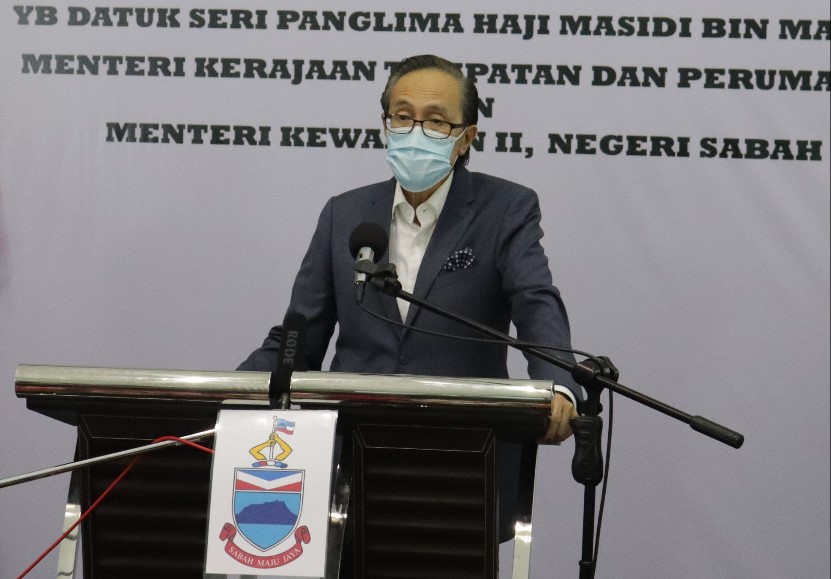KUALA LUMPUR, Oct 28 — A total of 3,796 coronavirus patients are using 52.5 per cent of 7,237 beds across nine Covid-19 hospitals and 35 quarantine centres in Sabah, Masidi Manjun said today.
The state housing and local government minister, who is also Sabah’s Covid-19 spokesperson, further clarified that he had made a mistake in his October 22 statement about 99.5 per cent of beds in Sabah facilities being filled up with Covid-19 patients.
He said that he had mistakenly taken the cumulative number of Covid-19 patients, instead of active cases.
“I hope this clarifies fear we don’t have enough beds to cater for all the patients in Sabah,” Masidi told a virtual press conference today on video conferencing platform Zoom, adding that Sabah has 126 intensive care unit (ICU) and critical care beds for Covid-19 patients.
The state minister, however, said he did not have statistics on the bed occupancy rates for each hospital and low-risk quarantine and treatment centre in Sabah, the current Covid-19 epicentre in Malaysia, nor the breakdown on available beds in hospitals versus quarantine centres.
The Malaysian Medical Association (MMA) has previously urged the Ministry of Health (MOH) to provide bed occupancy rates in individual hospitals and quarantine centres in Sabah, saying that health facilities in red zones reaching full bed capacity may be masked by lower usage in other centres.
Sabah reported 546 new Covid-19 cases today, comprising about 68 per cent of the 801 new infections reported nationwide. Sabah residents formed seven of eight Covid-19 fatalities reported today, including a 35-year-old Malaysian woman with high blood pressure, stroke, asthma, and dyslipidemia, who died in Kota Kinabalu.
When asked about complaints of critical Covid-19 patients waiting for up to two days to enter ICU in Queen Elizabeth Hospital in Kota Kinabalu, Masidi acknowledged that hospitals were trying their best to manage the situation.
“At this point of time, hospitals are still able to manage, though obviously in a very tight way.”
When asked about the number of positive Covid-19 patients on waitlists for admission into hospital or low-risk quarantine and treatment centres, Masidi said the Sabah state health department did not have such data.
“However, the Sabah state health department is always working with the district disaster management operations centre to create more quarantine centres to meet rising demand,” he said, adding that the state health department would also ensure that Covid-19 patients who need closer observation would be admitted into hospital for treatment.
Masidi acknowledged that medical frontliners in Sabah are under tremendous pressure and stress, in response to a Free Malaysia Today report about overworked ICU doctors taking sleeping pills.
“Considering the fact our facilities may not be as good as West Malaysia, we need to work doubly hard,” he said. “Like [all] human beings, at times you may end up having to take your own medication to stay alert.”
When asked if the Sabah state government would request for more additional health care workers from MOH, Masidi said 453 medical staff have been deployed to Sabah from the peninsula so far, and any additional human resources requested would depend on the number of Covid-19 cases in the state. Volunteers from private hospitals in Sabah have also been roped in.
“Our report from the health department indicates that the medical personnel or health personnel that have been deployed from peninsular Malaysia are able to adapt quite fast to the situation in Sabah,” he said.
“The Sabah state health department also ensures that human resources in the department are mobilised in turn in a systematic manner to prevent fatigue and burnout among medical and health care staff.
“We hope in three to four weeks’ time, we can rein in the pandemic to a number that is manageable.”
Masidi said the Sabah Covid-19 outbreak, which previously originated in the east coast, is now concentrated in the west coast, amid indications of declining cases in the east coast, as he described the state capital of Kota Kinabalu as the new epicentre in the state.
Kota Kinabalu reported 159 out of 546 new Covid-19 cases in Sabah today, followed by Sandakan (116) and Tawau (101), among various districts.
National Covid-19 Highlights
The Ministry of Health’s (MOH) report of 801 new Covid-19 cases today has pushed active cases in the country to 10,123. A total of 29,441 official positive Covid-19 cases have been reported so far during the epidemic in Malaysia.
Out of the 801 new Covid-19 cases, two were imported infections. The remaining 799 local transmissions are as follows:
- Sabah: 546 cases, one new Seri Gaya cluster in Kota Kinabalu and Tuaran
- Selangor: 88 cases
- Labuan: 29 cases
- Kedah: 28 cases
- Sarawak: 27 cases, one new Greenhill cluster in Kuching and Miri
- Negeri Sembilan: 24 cases
- Penang: 19 cases
- Kuala Lumpur: 13 cases, one new Idaman cluster in Petaling and Gombak in Selangor, and Titiwangsa and Cheras in Kuala Lumpur
- Terengganu: 11 cases
- Johor: 8 cases, one new Bayu cluster in Johor Baru and Muar
- Perak: 6 cases
A total of 94 Covid-19 patients are in ICU, including 25 on ventilator support.








